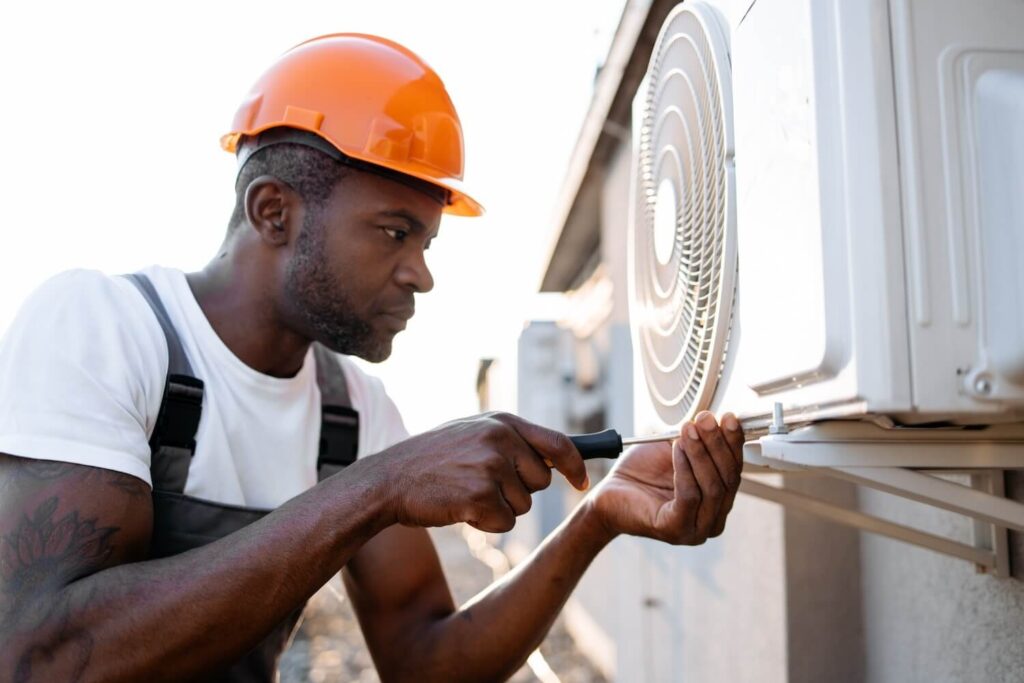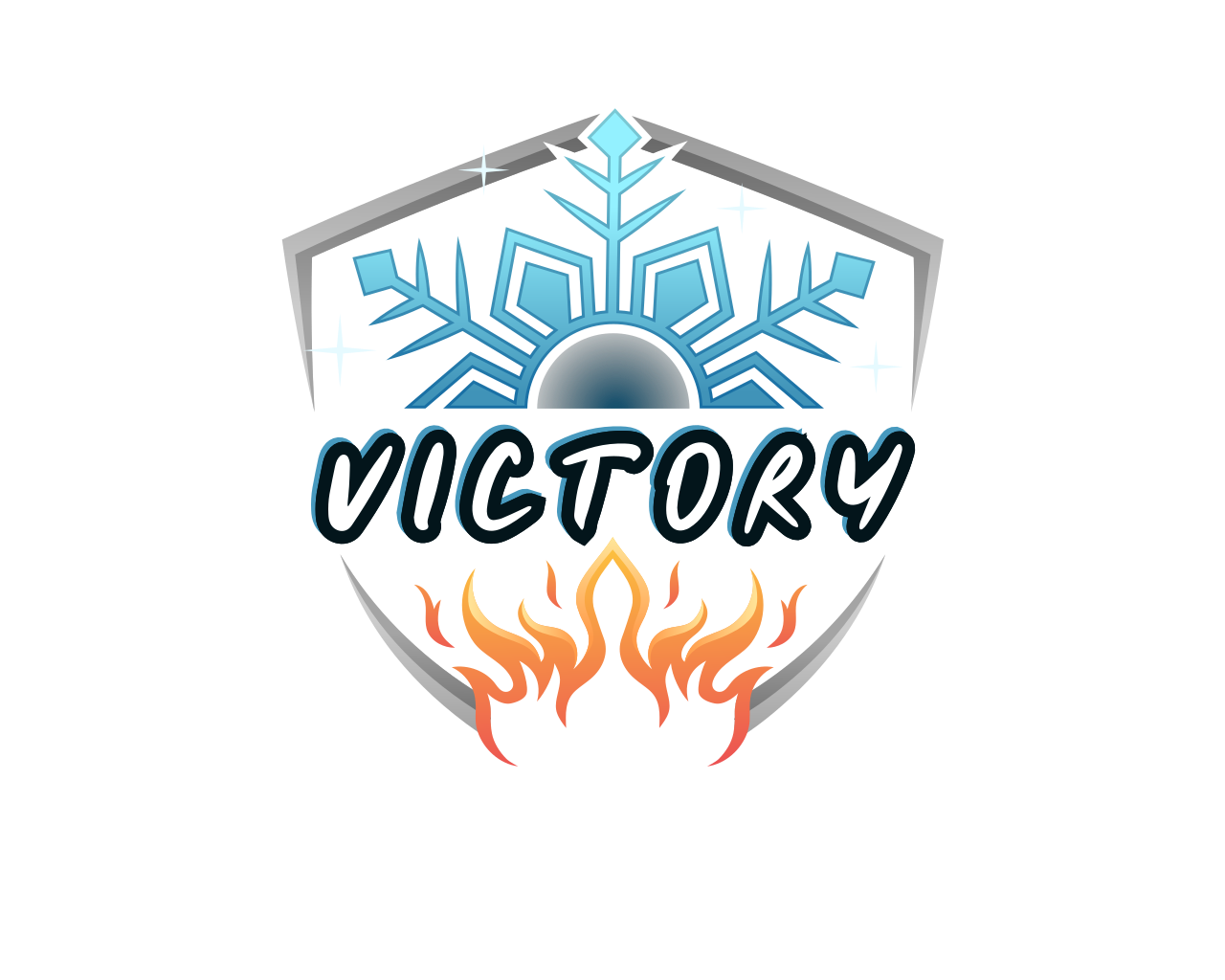
An air conditioning unit is a staple of comfort, especially during the hotter months. But what do you do when it malfunctions? Do you try to fix it yourself or call in a professional? Making the right choice is essential, as the wrong repair attempt could lead to greater costs, safety issues, and an uncomfortably warm home.
This guide breaks down the common issues you might face with your AC unit, the benefits of each approach, and tips for deciding when professional help is the best choice.
1. Air Conditioning Repair: A Look at What’s Involved
Understanding what AC repair involves can help you recognize whether an issue is manageable as a DIY project or if it’s time to call in an HVAC technician. Here’s a breakdown of the critical parts and systems that make up an air conditioning unit:
- Compressor and Condenser: These components are located outside and play a central role in cooling your home. The compressor pressurizes the refrigerant, which then flows to the condenser, where heat is released outside.
- Evaporator Coils: Found inside your home, evaporator coils absorb heat from the air inside your space, cooling it as the refrigerant evaporates.
- Thermostat: The thermostat controls the AC unit’s operations, telling it when to turn on and off and setting the desired temperature.
- Refrigerant Lines: The refrigerant lines connect indoor and outdoor components, transferring the refrigerant in both liquid and gas forms.
- Blower Fan and Motor: This system distributes cooled air throughout your home, providing the comfort you rely on.
Repairing these systems can involve tasks ranging from simple cleaning to complex part replacements, requiring specialized skills and tools. Evaluating each part’s role and repair complexity will help you decide whether DIY or a professional touch is appropriate.
2. DIY-Friendly AC Tasks: The Basics You Can Handle
While some AC issues require professional expertise, there are basic tasks that many homeowners can handle safely and efficiently on their own:
Thermostat Troubleshooting
Thermostat issues are one of the most common reasons an AC unit may not work properly. If the system isn’t turning on, check the thermostat’s battery or setting. Many thermostats allow manual calibration, a simple adjustment that can ensure your temperature settings align with actual room temperature.
Replacing Air Filters
Dirty filters can reduce airflow and hinder your unit’s performance. Replacing your filter every 1-3 months can prevent a significant buildup of dust and allergens. For DIYers, this task is both simple and crucial for maintaining efficiency. Regular filter replacement also reduces wear on your AC unit, preventing some major issues.
Clearing Debris Around the Outdoor Unit
Leaves, grass, and other debris can block airflow around your outdoor unit, causing it to work harder and overheat. Clearing this debris is an easy way to improve efficiency. Turn off the unit, then use a garden hose to wash away grime on the condenser fins and ensure there’s at least two feet of clearance around the unit.
Checking Circuit Breakers
If your AC won’t turn on, a tripped circuit breaker could be to blame. Flip the breaker back on if it’s been tripped, and if it happens repeatedly, this could indicate an underlying electrical issue best handled by a professional.
Cleaning the Condensate Drain Line
Your condensate drain line can develop clogs from algae, mold, or debris, especially in humid climates. This can result in leaks or water buildup. You can clean a clogged line using a wet/dry vacuum or a small brush, helping prevent moisture issues around the unit.
While these are tasks you can confidently attempt, knowing when to step back and seek professional assistance is equally important.
3. Warning Signs That Demand Professional AC Repair
Certain symptoms signal that a DIY approach may not suffice. If you encounter any of the following issues, calling a professional HVAC technician is recommended:
Loud or Unusual Noises
Hearing grinding, squealing, or clanking noises is a strong indicator that something inside your unit isn’t functioning correctly. These sounds could point to worn-out bearings, loose components, or motor malfunctions. Without the proper knowledge, attempting to open the unit could lead to further damage.
Refrigerant Leaks
Low refrigerant levels indicate a leak, as refrigerant doesn’t naturally deplete. Handling refrigerant requires special training and equipment, and it’s illegal to release refrigerants into the environment. A professional can locate and seal the leak, then recharge the refrigerant in compliance with EPA regulations.
Frequent Cycling (Short Cycling)
If your AC unit frequently turns on and off (a phenomenon known as short cycling), this could be caused by an oversized unit, thermostat issues, or a failing compressor. Short cycling causes unnecessary wear and tear on your system, reducing its lifespan and efficiency. This problem requires diagnosis by a skilled HVAC technician.
Uneven Cooling or Poor Airflow
When certain rooms aren’t cooling like the rest of the house, it could indicate a blocked duct, failing compressor, or blower fan issue. These problems are often complex and may require professional duct cleaning, component repair, or replacement.
Unusual Smells
Odd smells, such as musty or burning odors, are warning signs. A musty smell could mean mold has formed in the unit or ductwork, while a burning smell might point to electrical issues. These situations require professional expertise to ensure safe and effective solutions.
4. The Dangers of DIY AC Repair: What’s at Stake?
Although DIY fixes can seem like a cost-effective solution, attempting complex repairs without the right skills and tools can be risky:
Electrical Hazards
AC units use high-voltage power, which presents a risk of electrocution if handled improperly. Additionally, wiring mistakes can create fire hazards, especially if circuits are accidentally overloaded.
Refrigerant Exposure
Handling refrigerant is dangerous and requires EPA certification due to its environmental and health risks. Direct exposure can cause frostbite, respiratory issues, and other serious health complications.
Warranty Repair Issues
Most air conditioning units come with warranties that cover part or all of the repair costs. However, attempting a DIY repair may void the warranty, making it essential to hire licensed professionals to maintain warranty protection.
Potential for Greater Damage
Without expertise, it’s easy to make mistakes that worsen the problem, increasing the cost of repair. For example, a simple wiring error could lead to a burnt-out compressor, requiring an expensive replacement.
For these reasons, knowing when to call an HVAC technician can save you time, money, and stress.
5. Benefits of Hiring a Professional AC Technician
Opting for professional help brings numerous advantages beyond just fixing the immediate issue:
Accurate Diagnostics
A certified technician has the training to quickly identify problems and prevent unnecessary repairs. Their experience allows them to target the exact source of the issue, ensuring that repairs are both effective and long-lasting.
Safety and Compliance
Professionals follow strict safety protocols, especially when working with high-voltage systems and refrigerants. Additionally, HVAC technicians ensure compliance with local building codes and EPA standards, providing peace of mind.
Specialized Equipment and Expertise
HVAC technicians use specialized tools such as refrigerant gauges, vacuums, and leak detectors that are typically unavailable to homeowners. With their expertise, they can address intricate issues without causing additional damage.
Enhanced AC Efficiency and Performance
Routine maintenance services from a professional can optimize your unit’s efficiency, helping lower utility bills and extend the system’s lifespan. Professional repairs also reduce the likelihood of recurring issues.
Access to Replacement Parts and Warranty Services
Professionals often have access to original manufacturer parts, which ensures the quality and compatibility of the replacement components. Additionally, they can perform repairs in a way that keeps your unit under warranty.
6. Professional AC Maintenance: A Proactive Approach
While emergency repairs are essential, preventive maintenance is the best way to ensure your AC runs smoothly throughout the year. Scheduling regular maintenance with an HVAC technician can prevent costly repairs and improve your unit’s energy efficiency. Here’s what a professional maintenance visit typically includes:
- Cleaning and Inspecting Coils: Dirty coils reduce your unit’s cooling capacity and force it to work harder. Technicians can clean both the evaporator and condenser coils to restore efficiency.
- Checking Refrigerant Levels: Low refrigerant levels reduce cooling performance and strain the compressor. A professional can top off the refrigerant and check for leaks if needed.
- Testing the Thermostat: Technicians can recalibrate or even replace the thermostat if necessary, ensuring accurate temperature control.
- Examining the Electrical Components: Technicians check for frayed wires, loose connections, or worn-out capacitors that could lead to electrical hazards.
- Assessing Airflow: Airflow measurements help detect any blockages or fan issues that may reduce performance.
Scheduling professional maintenance annually, especially before peak cooling seasons, can help prevent breakdowns and keep your AC running at peak efficiency.
7. Understanding the Costs: DIY vs. Professional Repair
Cost is often a major factor in deciding between DIY and professional repair. Here’s a comparison of potential costs:
DIY Repair Costs
DIY repairs might cost less, depending on the problem. For example:
- Thermostat Batteries: $5–$10
- Air Filter Replacement: $10–$50, depending on filter type
- Basic Cleaning Supplies: Around $20
Professional Repair Costs
Professional services generally cost more but address complex issues thoroughly:
- System Diagnostic Fee: $75–$200
- Compressor Repair/Replacement: $800–$2,800
- Refrigerant Recharge: $100–$600
- Electrical Repair: $150–$500
Ultimately, professional repairs often provide greater long-term value by preventing repeat issues and safeguarding your system’s warranty.
Conclusion
Deciding between DIY and professional AC repair comes down to understanding the complexity of the problem, your comfort level with repairs, and the potential risks involved. While tasks like filter changes, thermostat adjustments, and basic cleaning are safe and manageable for most homeowners, more complex issues involving refrigerant, electrical components, or unusual noises are best left to professionals. Choosing professional AC repair not only ensures the problem is accurately diagnosed and safely resolved but also preserves the efficiency and longevity of your system.
By knowing when to call an HVAC technician, you protect your investment and avoid potentially costly mistakes. And with routine maintenance, you can keep your air conditioning unit performing optimally, ensuring that your home stays comfortable no matter the season. Remember, a proactive approach and a well-maintained AC system ultimately save you time, money, and stress, giving you peace of mind and reliable comfort all year round.
